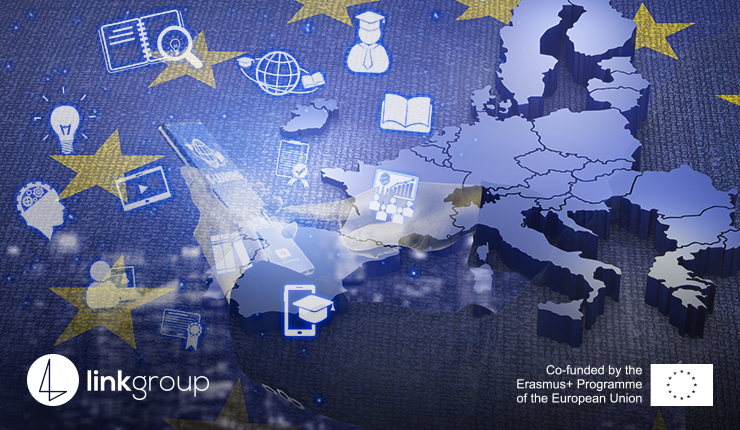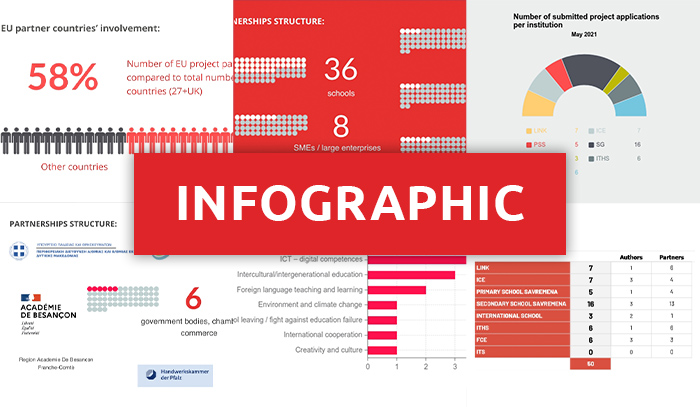LINKgroup’s institutions apply for over 50 European projects
Various institutions within the LINK Educational Alliance have applied for more than 50 forthcoming international EU-level projects, in addition to 11 EU-funded projects already in progress in which our institutions are already participating.
First results to arrive at the beginning of the next school year
Between March and May, the Project Center and LINK group’s various organizations and institutions have responded to Erasmus+ project calls with over 50 project proposals, as main applicants or partners. The results of this considerable effort will be known at the beginning of the next school year; we hope that the European Commission will accept a large number of these proposals.
The colleagues from Savremena Gimnazija have the largest “share” in these projects, with 16 proposals in total, three of which they sign as the main authors. ITHS has submitted seven proposals, while the Faculty of Contemporary Arts is participating in six project proposals, three of which they sign as the direct applications.
Project applications include two designed for US Embassy funding, submitted by the International School and the Institute for Contemporary Education.
In the process of preparing our proposals, we collaborated with over 300 partners – schools, institutes, faculties, school boards, companies, state institutions and NGOs across Europe. The list of partners with whom we worked closely includes Italy’s d-Learn network, Bulgaria’s Adam Smith College of Management/NTC center and Slovenia’s Smart Idea.
Such a large number of applications stems from the fact that the Project Center’s training and mentorship have empowered teachers to write their own projects. As a result of the series of training programs and workshops held at LINK Educational Alliance’s schools and higher education institutions, many teachers have expressed an interest in designing and writing projects and connecting with colleagues across Europe.
Currently active in 11 international projects
Having submitted these numerous new applications, LINKgroup’s organizations continue to participate in as many as 11 current international projects:
1. “ClimAct Now!” (ITHS) – project related to “Sustainable Development Goal 13” from the UN’s 2030 agenda, where the students strive to make the best possible contribution to the fight against climate change.
2. “Cultural Exchange through ’Web 2.0 tools’” (ITHS) – where the students’ goal is to present their culture, tradition and beliefs using Web 2.0 tools.
3. “Together to a Better Technology” (ITHS) – project designed in order to enhance the qualifications of the school personnel and to provide students and parents with skills that will advance their use of technology and safe internet use.
4. SPEAKER (ITHS) – project aimed at nourishing multilingualism and diversity in the EU through “Escape Rooms” language courses.
5. “Barcode” (ITHS) – project that increases the implementation rate of innovative teaching methods and dispels the prejudices regarding the use of innovative teaching methods.
6. “Digital education zone” (ITHS) – which will prepare educators for teaching in different European countries in order to resolve the problem of low and very low motivation among students.
7. “Citizen 2.1” (ICE) – project aimed towards the exchange of the best practices in the realm of the development of the educational competences related to digital skills. The project consortium comprises eminent European educational institutions from Germany, Belgium and France, along with the Institute for Contemporary Education – ICE from Serbia.
8. “The Art of De-biasing (dBias)” (ICE) – the objective of this project is to provide the first and only practical IT tools, strategies and functional methodology for cognitive bias management.
9. “Girls Go Circular” (International School, Savremena Gimnazija and ITS) – project aimed at increasing the number of women in digital industries and entrepreneurship, unfolding within the comprehensive “Skills for the Future” initiative, as a part of the EU’s “Horizon 2020” strategy.
10. “Together” (LINKgroup and Savremena Gimnazija) – project designed in order to transform schools into “open learning organizations” that become cultural hubs for the entire community. It is financed by the National Agency of Germany, its main coordinator is the Berlin Cosmopolitan School, and the partners are from Germany, Cyprus, Spain, Italy, Belgium, Portugal, Bulgaria and Serbia.
11. “ENGlife” (International School) – project aimed at the strengthening of English teachers’ digital competences and providing a methodological framework for learning English for “native” digital students. The project is financed by the Polish National Agency, and we have partnered up with secondary schools from Ireland, Italy, Poland, Serbia, Greece, Turkey and Estonia.
Training teachers from across the region
Another important achievement we would like to mention is the fact that Primary School Savremena and Savremena Gimnazija have used the Erasmus+ framework to offer the first courses designed for teachers from the region and the entire Europe.
CLICK ON IMAGE TO SEE INFOGRAPHIC
Created with Project Center’s mentorship, these courses will serve as the basis for KA1 mobility projects, which will bring foreign educators to Serbia to learn about innovative working methods, as well as about Serbia and its cultural and historical heritage.
Europe increases investments in education
This year, the European Commission has launched a new seven-year project finance program for various fields, with the Erasmus program primarily concerned with education. It has been encouraging to learn that the funds for this period amount to as much as 26.2 billion euros, which means twice as much money designated for education compared to 2014–2020.
The priorities are:
- the digitalization of education;
- basic skill development;
- activities against climate change;
- the inclusion of marginalized groups and all groups whose opportunities are potentially compromised by health issues, minority status, economic difficulties or distance from educational centers.
We are sure that the pandemic situation will improve by autumn and that project implementation will commence at full capacity. Along with the dedication to innovation and professional training for teachers, this will bring along foreign trips, learning about school systems and colleagues in various European countries and exchange of good practices, all dedicated to further improving our MO and ensuring that we keep offering state-of-the-art educational approaches and methods to students across our educational institutions.




Leave a comment